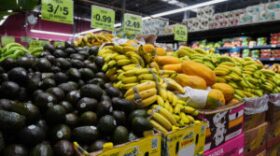Food pantries and other nonprofits that help keep people in need fed are expecting an increase in demand for services with Supplemental Nutrition Assistance Program recipients facing delays in getting their benefits – and now they’re expected to get less than the full amount of aid for this month.
On Monday, the Trump administration told a federal judge the government would pay just half of the scheduled amount of the Supplemental Nutrition Assistance Program benefits for November. The administration said it will use money from the $5 billion Agriculture Department contingency fund, which falls short of the $8 billion that SNAP typically uses each month.
This means nearly 600,000 Kentuckians and over 710,000 Tennesseans will go without the full benefits they normally receive.
Elyse Bell, the director of First Methodist Church’s food pantry in Paris, Tennessee, said she’s expecting requests for help with food to go up because of that.
“We accept additional families that are food insecure and come seeking additional food because of SNAP. So yes, we see them all the time, so it's going to really increase the good work that we do here,” Bell said.
First Methodist Church’s food pantry provides pre-packaged, shelf stable goods. They also provide bags that those in need can use to carry their food home. Apart from the food pantry operating every Monday and Friday, they also have a drive-through distribution twice a month.
Sally Michelson, the director of Community Kitchen in Paducah, said she, too, is expecting more requests for aid. But Michelson said this is nothing new for her nonprofit.
“We’re prepared. We do this all the time, this is nothing new for us,” she said.
Community Kitchen gives out fresh, hot meals five days a week. If they have a surplus of donations, they send folks home with the extras.
“No one leaves here hungry. We do not have any criteria [for] who walks in the door,” Michelson said. “Anybody who comes that's hungry is welcome.”
Community Kitchen also provides showers and laundry services.
Both Bell and Michelson said there are many ways to help nonprofits meet increased demand, like donating nonperishables or volunteering.
Gov. Andy Beshear issued an executive order committing $5 million from Kentucky’s budget reserves to support the seven member food banks of Feeding Kentucky, which provide groceries to all 120 counties.
“I would say the best way to help through raising awareness is making a donation of funds or canned items or volunteer time at your church and community. Those are all really important things,” Bell said.
To find and learn about food pantries or other nonprofits near you, visit findhelp.org.





